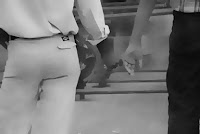
Syria’s gays, lesbians fight discrimination
Law, society treat homosexuals as criminals, outcasts or mentally ill as latters find refuge online.
DAMASCUS - Alaa al-Sayed, 20, is waging a battle for acceptance not just from Syrian society but from his own family since they discovered he is gay.
“It’s so difficult to feel that you are a stranger and an outcast even in your own home,” he said.
When his parents found out about him after he went out with a man one night, they beat him and locked him in at home. Later, they decided to marry him off, he said.
“This is the solution in their opinion. The solution is doing an injustice to a woman for whom I feel no emotional or sexual desire,” he added.
Many gay men and women like Sayed lead a life on the margins of Syrian society, which generally sees them as perverts or mentally ill.
They also suffer from discrimination on the part of the state that considers homosexual acts as “moral offences” punishable by up to three years in prison.
The Syrian penal code prohibits "carnal knowledge against the order of nature", which is mostly used to criminalise sodomy, so lesbians are less liable to be persecuted than gay men.
In addition, unlike gay men, lesbians are less likely to go cruising in parks and on the street where they could be caught by the police.
While most gay people in Syria prefer to hide their sexual tendencies and submit to social norms or lead a double life, more and more say that they are slowly asserting their right to be different.
Some say that they are not afraid to display their sexuality in bars and nightclubs in the way they dress or behave.
For many of them, especially young gay men, the internet has helped them to regroup, create a network of social support, and meet others in similar situations.
“The internet brought a real change to my life,” said Nouhad Ibrahim, a 21 year-old gay man from Damascus studying economics.
“I discovered gay communities from around the world and that made me feel I was not alone in this world.”
Online, Syrian homosexuals can find several dating and chatting websites where they can exchange photos and telephone numbers and sometimes fix dates to meet.
But some gay men are also using the internet as a platform to demand recognition and respect.
A pan-Arab Facebook site aimed at countering the negative stereotypes about homosexuality has more than 400 members including a large presence from Syrian gays.
Members of the group say that they are trying to muster support especially from international organisations to show how gay men can contribute to the development of society and do not have lower intellectual capabilities.
A separate Facebook group called Syrian Gays has 170 members and is used for chatting and meeting partners rather than as a platform for discussions around homosexuality in the country.
But for most gay men, the topic of their homosexuality is still a taboo and so they prefer not to divulge their tendencies in a society that values machismo.
Amir, a 24-year-old gay man who works in his father’s clothing shop in Damascus, said that he had to pretend to be very manly in the way he talked and walked during the day.
Amir, who refused to give his last name, added that at night among his gay friends he felt more relaxed and able to express his “feminine side”.
Syrian gays today say that there are several cafes, bars and nightclubs where they meet in Damascus. Cruising for sexual partners also takes place in certain public squares or gardens during the night.
Gay prostitution is also evident at these sites but many say that the places are monitored by the morality police.
Individuals who are caught by the police engaging in homosexual acts are often rounded up and sent to court where they generally receive a sentence of few months’ imprisonment.
An official who spoke on condition of anonymity said that the authorities do not recognise gay rights and homosexuality was rejected by Syrian society and culture.
“For gays and lesbians not to be subjected to mistreatment or harassment, they must keep their sexuality concealed,” he said.
Dr Jalal Nawfal, a Damascus-based psychiatrist, said that the authorities were only responding to the social and religious realities of Syria, where homosexuality is strongly rejected.
He added, however, that the government needed to raise awareness about homosexuality.
Although homosexuality is no longer regarded as a psychological disorder in the West, many Syrian psychologists still see gays as mental patients.
Some even say that sexual harassment during childhood plays an important role in determining sexual orientation during adulthood.
Christian and Muslim clerics who have a strong influence over social attitudes in Syria are more severe in judging homosexuality.
According to Mohamad Habash, the head of the Centre for Islamic Studies in Damascus, some Muslim clerics overtly incite the killing of homosexuals.
Other less extreme opinions favour providing gays with social support to help them “overcome their illness”, he added.
The media in Syria also consolidates the negative stereotyping of homosexuals by publicising stories that link gays to criminal acts or sordid incidents.
Last year, for instance, a court sentenced three men to death for killing a diplomatic employee after having sex with him.
Media also reported that a young man died after throwing himself from a balcony in the city of Aleppo to escape two men who wanted to rape him.
Many gays in Syria believe the spreading of similar stories harms their cause.
Written by an IWPR-trained reporter
link: http://www.middle-east-online.com/english/?id=35834
